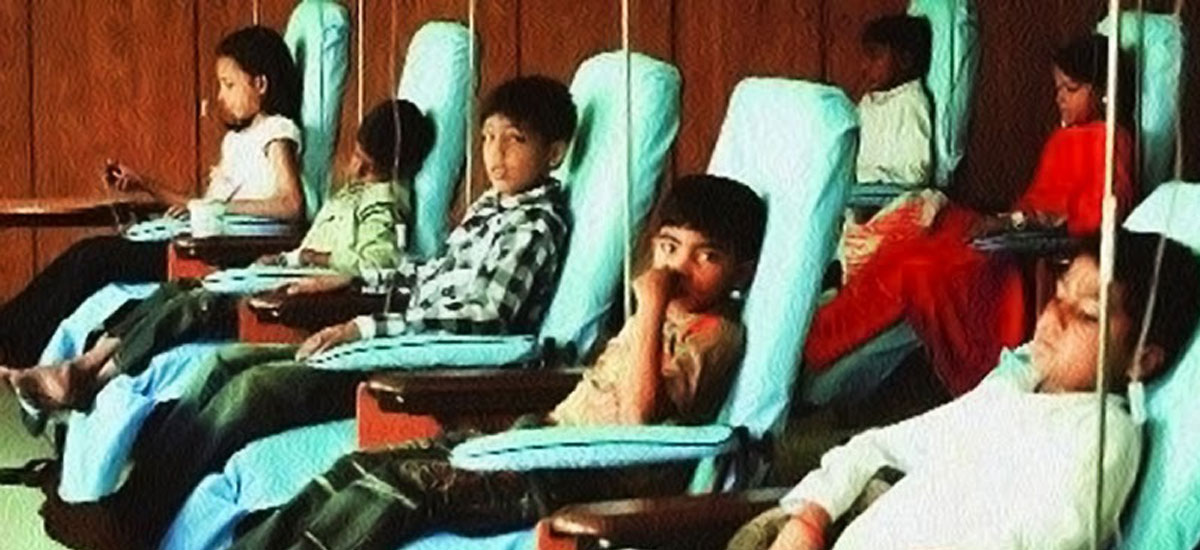Threat to our tomorrow; our children: Thalassemia
By Kaukab Tahir Shairani
23 April 2016
Most prevalent of Pakistan’s problems is security. But security has not grown weaker in terms of political and social instability alone; it is unfortunate that a huge number of people suffer from health deficiencies often threatening in their impact. Even though this is the case all over the world, Pakistan suffers more than usual due to lack of proper health facilities for its citizens. thalassemia, a very dreaded blood disorder, is reported in high figures in Pakistan. Almost 5,000 patients are diagnosed thalassemia yearly, with a prevalence rate of 6% among the Pakistani population. As part of their routine, affected patients get blood transfusions every few weeks for smooth functioning of their body. Ill-health brought by the disorder is often witnessed in form of queues outside hospitals and clinics in Karachi and rest of the country.Thalassemia is an inherited blood disorder. It results in an inability of the body to produce the required amount of Hemoglobin in the red blood cells. This inadequacy leads to severe anemia. Two major proteins that produce the red blood cells are Alpha and Beta. The absence of either can lead to insufficient formation of red blood cells. Thalassemia minor is a no-symptom disorder, whereby a patient found with this disorder would not manifest any particular thalassemic dysfunction. These patients only experience a lower range of hemoglobin such as 7 or 8. Whereas, thalassemia major is either the absence of Alpha or Beta, that hinders the production of hemoglobin in its sufficient quantity. In Pakistan though, more common of the two is Beta thalassemia major. The union of two thalassemia minors forms a thalassemia major. Dr. Talat Bashir, a pediatrician and in-charge of the thalassemia program at Civil Hospital, Karachi, said, “The primary task is to stop two thalassemia minors from getting married so as to avoid an offspring with a thalassemia major condition.” She also affirmed that usually the age old trend of inter-family marriages in a Pakistani society has led to increased cases of thalassemia. “Drift away from inter-family marriages and parents should marry their children outside of family,” she advised.
Suffering from thalassemia, not only a blood transfusion becomes mandatory, but children suffering from this deficiency also require treatment for iron overload in the body which is caused by an increased number of transfusions. Excessive iron in the body is treated by an iron chelation therapy, whereby patients are given agents either orally or by injection, that cause the residue to excrete the body. Iron Chelation Therapy, however, is an extremely pricey procedure in Pakistan. Therefore, not everyone suffering from iron overload can afford it.
Symptoms of Thalassemia become apparent soon after birth. However, measures have been introduced to diagnose the disorder in a woman while she is pregnant. This has enabled doctors and mothers to know in advance whether the child has the disorder or not. Chronic Villius Sampling (CVS), a process through which experts can diagnose Thalassemia in a baby prior to its birth, has aided many such situations to be controlled. CVS is a prenatal test whereby a sample of chronic villi is removed from the placenta for testing. However, the desired purpose of this procedure can only be fulfilled if it is done in the first twelve weeks of pregnancy, in case the couple expecting the child decides to abort the fetus before its formation into a baby. In Pakistan, abortion generally requires a fatwa from a scholar (maulvi) that confirms that the circumstances under which it is happening are dire.
Due to lack of health facilities and awareness programs, not much has been done to treat this disorder. The quickest treatment of Thalassemia is a blood transfusion; however, it does not serve as a long-term remedy. An elaborate form of treatment for Thalassemia is a bone-marrow transplant, whereby, the bone-marrow that causes the deficiency of red blood cells in the body is replaced. Unfortunately, due to its cost, lack of resources, and unavailability of skilled staff and transplant centers, only 100 patients benefit from this procedure every year. Currently, a bone- marrow transplant is available only in Karachi, Lahore, Islamabad and Rawalpindi. So far, it is done in the private sector only. However, the Punjab government has released funds to make this facility available for the first time in publicly run hospitals.
“In July, this year’s first bone marrow transplant operation will be carried out at the Children Hospital in Lahore under the supervision of Professor Dr. Tahir Shamsi, Consultant Hematologist & Transplant Physician and Medical Director of National Institute of Blood Diseases & Bone Marrow Transplantation, Karachi (NIBD),” a notification issued by the Punjab Health Department said. As part of the process, a memorandum of understanding has been signed between the government of Punjab and the NIBD, whereby NIBD shall provide assistance to the Punjab government in building a bone-marrow transplant center at the Children Hospital, Lahore.
“A nine-member team is being trained here at the NIBD under my supervision,” Dr. Shamsi told The Express Tribune, who has been appointed as a convener and consultant for bone-marrow center at the Children Hospital.








